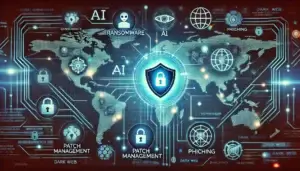How AI is Shaping the Future of Cyber Defense: Pros and Cons

In today’s fast-paced digital landscape, cyber threats evolve rapidly, making it increasingly difficult for traditional defense systems to keep up. Artificial Intelligence (AI) is stepping into the spotlight, transforming cyber defense with predictive analytics, automation, and smarter threat detection. However, with its many advantages come some noteworthy challenges. Here, we dive into how AI is reshaping cyber defense and the pros and cons of integrating AI into cybersecurity strategies.
The Pros of AI in Cyber Defense
- Enhanced Threat Detection and Response: AI-powered systems can detect and respond to threats much faster than human analysts, using machine learning algorithms to identify patterns in large datasets, flagging potential threats before they escalate.
- Automation of Repetitive Tasks: By automating repetitive tasks, AI frees up cybersecurity professionals to focus on more complex issues.
- Proactive Threat Hunting: AI enables proactive threat hunting, using predictive analytics to identify possible attack vectors before they are exploited.
- Improved Accuracy and Reduced False Positives: AI systems learn to distinguish between actual threats and harmless anomalies, improving alert precision.
- Scalability: AI solutions are highly scalable, ideal for large organizations with vast networks and complex threat landscapes.
The Cons of AI in Cyber Defense
- Dependency on Data Quality: AI models rely on high-quality data, and poor-quality data can lead to inaccurate threat detection.
- High Costs and Resource Demands: Implementing AI-powered solutions can be costly, especially for small to mid-sized companies.
- Risk of Adversarial Attacks: Hackers exploit AI weaknesses through adversarial attacks, manipulating data inputs to deceive AI systems.
- Ethical and Privacy Concerns: Data privacy issues arise with AI systems, as they often process sensitive information.
- Human Expertise is Still Required: AI cannot replace human judgment for complex or nuanced threats, making human expertise crucial.
Conclusion
AI is revolutionizing cyber defense, making it faster, smarter, and more proactive. However, it is essential to understand both its potential and limitations. While AI can streamline many aspects of cyber defense, it must be implemented thoughtfully, balancing automation with human oversight and ethical considerations. As AI technology continues to advance, its role in cybersecurity will only grow, providing new tools and insights to combat emerging threats.



